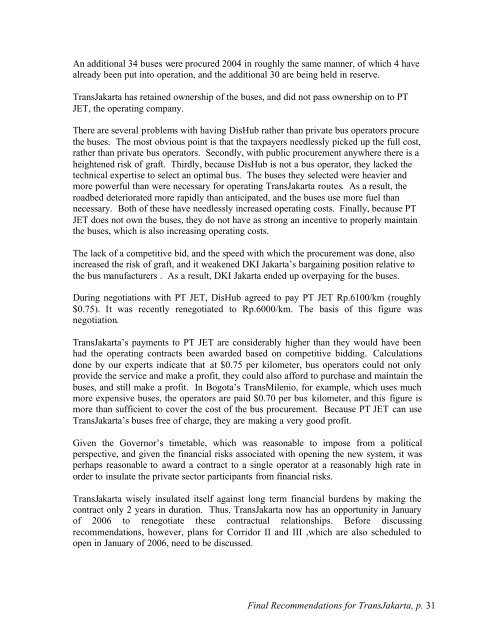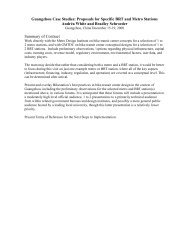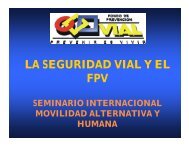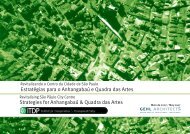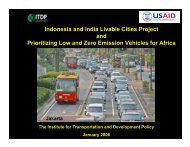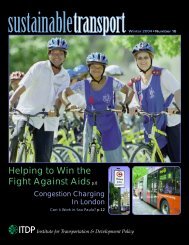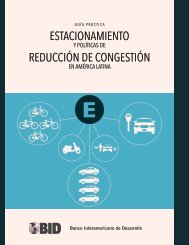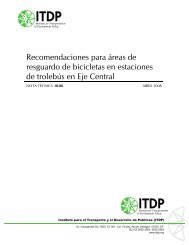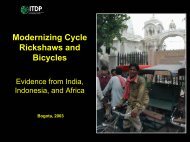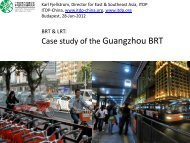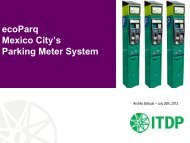Making TransJakarta a World Class BRT System - ITDP | Institute for ...
Making TransJakarta a World Class BRT System - ITDP | Institute for ...
Making TransJakarta a World Class BRT System - ITDP | Institute for ...
You also want an ePaper? Increase the reach of your titles
YUMPU automatically turns print PDFs into web optimized ePapers that Google loves.
An additional 34 buses were procured 2004 in roughly the same manner, of which 4 have<br />
already been put into operation, and the additional 30 are being held in reserve.<br />
<strong>TransJakarta</strong> has retained ownership of the buses, and did not pass ownership on to PT<br />
JET, the operating company.<br />
There are several problems with having DisHub rather than private bus operators procure<br />
the buses. The most obvious point is that the taxpayers needlessly picked up the full cost,<br />
rather than private bus operators. Secondly, with public procurement anywhere there is a<br />
heightened risk of graft. Thirdly, because DisHub is not a bus operator, they lacked the<br />
technical expertise to select an optimal bus. The buses they selected were heavier and<br />
more powerful than were necessary <strong>for</strong> operating <strong>TransJakarta</strong> routes. As a result, the<br />
roadbed deteriorated more rapidly than anticipated, and the buses use more fuel than<br />
necessary. Both of these have needlessly increased operating costs. Finally, because PT<br />
JET does not own the buses, they do not have as strong an incentive to properly maintain<br />
the buses, which is also increasing operating costs.<br />
The lack of a competitive bid, and the speed with which the procurement was done, also<br />
increased the risk of graft, and it weakened DKI Jakarta’s bargaining position relative to<br />
the bus manufacturers . As a result, DKI Jakarta ended up overpaying <strong>for</strong> the buses.<br />
During negotiations with PT JET, DisHub agreed to pay PT JET Rp.6100/km (roughly<br />
$0.75). It was recently renegotiated to Rp.6000/km. The basis of this figure was<br />
negotiation.<br />
<strong>TransJakarta</strong>’s payments to PT JET are considerably higher than they would have been<br />
had the operating contracts been awarded based on competitive bidding. Calculations<br />
done by our experts indicate that at $0.75 per kilometer, bus operators could not only<br />
provide the service and make a profit, they could also af<strong>for</strong>d to purchase and maintain the<br />
buses, and still make a profit. In Bogota’s TransMilenio, <strong>for</strong> example, which uses much<br />
more expensive buses, the operators are paid $0.70 per bus kilometer, and this figure is<br />
more than sufficient to cover the cost of the bus procurement. Because PT JET can use<br />
<strong>TransJakarta</strong>’s buses free of charge, they are making a very good profit.<br />
Given the Governor’s timetable, which was reasonable to impose from a political<br />
perspective, and given the financial risks associated with opening the new system, it was<br />
perhaps reasonable to award a contract to a single operator at a reasonably high rate in<br />
order to insulate the private sector participants from financial risks.<br />
<strong>TransJakarta</strong> wisely insulated itself against long term financial burdens by making the<br />
contract only 2 years in duration. Thus, <strong>TransJakarta</strong> now has an opportunity in January<br />
of 2006 to renegotiate these contractual relationships. Be<strong>for</strong>e discussing<br />
recommendations, however, plans <strong>for</strong> Corridor II and III ,which are also scheduled to<br />
open in January of 2006, need to be discussed.<br />
Final Recommendations <strong>for</strong> <strong>TransJakarta</strong>, p. 31


